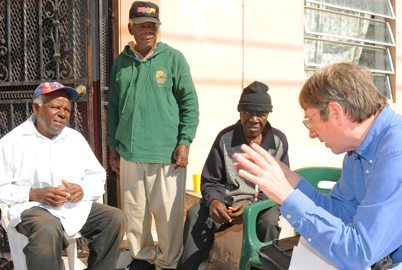
At 68, an age when most Americans are drawing Social Security and enjoying their retirement, Jean Felix Philius would like nothing more than to be back at work picking beans all day in the scorching South Florida sun.
Instead, Philius is unemployed and hoping to recover wages he says are owed him by his former employer, a Homestead bean farm that is the largest
in the state.
Philius says the farm’s records from the 2010 harvest season show he was idle for long stretches of time when he was actually working.
He alleges the farm paid him a flat rate per bushel during the 2009-10 harvest, and that much of his time was unaccounted for in the records to cover up the difference between what he actually earned and what he would have earned had he been paid minimum wage for every hour he spent in the field.
In short, he says his pay didn’t add up to beans — at least not as many as he picked.

“I want the truth to be told,” said Philius, a U.S. citizen who immigrated to the United States from Haiti in 1981. “The records show I was there and slept. That’s not true. I worked hard.”
Representing Philius and more than 80 of his former coworkers is Greg Schell of Florida Legal Services’ Migrant Farmworker Justice Project, which filed a class action against the farm that resulted in a 2009 settlement agreement requiring the grower to employ workers like Philius directly, rather than through a labor contractor, and to use a time clock to keep accurate records of their time worked. The Migrant Farmworker Justice Project is funded in large part by The Florida Bar Foundation, which provided the project a general support grant of $861,052 for 2010-11.
The bean industry employs many older workers, Schell says, because it’s hard to find younger workers who would accept such low wages. But only the most nimble workers could pick at a rate fast enough to amount to minimum wage at the piece rate crew leaders offer, he says.
Legally, the employer is obligated to make up the difference between the piece rate and the minimum wage, but Schell alleges the crew leaders falsify payroll records to skirt the law.
Schell has opened a new case because he believes the farm has not complied fully with the terms of the 2009 settlement agreement. His latest suit alleges that the grower only put a fraction of the workforce on the payroll during the 2009-10 harvest season.
“And they didn’t have a timeclock,” he said. “No ifs, ands or buts, they didn’t have a timeclock.”

Since graduating from Harvard Law School in 1979, Schell has dedicated the vast majority of his waking hours to protecting the rights of Florida’s migrant farmworkers. He began his career in Immokalee, Fla., a farming town east of Ft. Myers, where he leveraged his rusty high school French to learn Haitian Creole while working for $10,000 a year as a staff attorney for Florida Rural Legal Services.
In Immokalee, Schell studied from a small pamphlet of Creole phrases and arranged to have in his office a communal mailbox for the local Haitian migrant workers, which proved a highly successful outreach method.
Back then, much of his work was funded by the Legal Services Corporation, which grants federal funds to legal aid organizations nationwide.
When the federal government placed restrictions on LSC funding that included a prohibition against class action lawsuits and against serving undocumented immigrants, The Florida Bar Foundation provided the funding to bring the Migrant Farmworker Justice Project into existence under Florida Legal Services as a successor to the farmworker representation done previously through Florida Rural Legal Services.
This enabled Schell and the project’s other attorneys to continue their work, which they now do out of an office in Lake Worth, just south of West Palm Beach.
“It wouldn’t have happened without the Bar Foundation,” Schell said. “The Florida Bar Foundation is an extraordinary entity. They had more foresight than anybody else in the country when the restrictions came in. They thought ahead and from day one, there was never a lapse in coverage.”
Besides Schell, the Migrant Farmworker Justice Project’s staff includes three other attorneys and several paralegals and outreach workers, all of whom speak at least two languages. They are all masters at working with hard-to-serve populations across barriers that include language, culture, illiteracy, poverty, immigration status and the transience of workers who follow the harvests. Schell estimates that there is at least a 75-percent turnover rate in workers at any given farm from one harvest season to the next.
“So as a result, it’s a never ending task to make people aware of our services,” Schell said. “Almost every corner of the state has substantial pockets of farmworkers.”
The project, which is statewide in scope, has secured a number of landmark decisions from the U.S. Eleventh Circuit Court of Appeals, including one that established that growers shared the responsibility for upholding labor laws with the labor contractors providing the crews. In that suit, and many others, Schell has uncovered violations of minimum-wage laws, as well as failure to pay Social Security and unemployment taxes and to maintain accurate payroll records.
When honoring Schell with its Reginald Heber Smith Award in 2004, the National Legal Aid & Defender Association issued a press release in which it said of the case that established the growers responsibility for labor-law compliance:
“After the successful appeal, the plaintiffs received one of the largest back-wage payments ever made to farmworkers within the United States. In addition, millions of dollars of the farmworkers’ earnings were reported to the government, qualifying and/or increasing the workers’ eligibility for Social Security, SSI, food stamps and Medicaid benefits.”
Paul Doyle, director of the Foundation’s Legal Assistance for the Poor Grant Program, said of all the outstanding career legal aid lawyers in Florida, none outshines Schell.
“His commitment, more aptly described as devotion, to justice for farmworkers is singularly remarkable,” Doyle said. “His legal acumen is astounding. He has made a difference in the lives of thousands of farmworkers and their families.”
In spite of the many accolades Schell’s work has received, including a 2010 Steven M. Goldstein Award for Excellence from The Florida Bar Foundation, Schell is well aware that his work makes him unpopular with some. He says he’s been accused of trying to shut down agricultural industries such as sugarcane, but he is unfazed by the criticism.
“There are a lot of free market people who think you ought to be able to pay people whatever they’re willing to work for,” Schell said. “I think the minimum wage isn’t such a bad idea, but it doesn’t matter what I think. It is the law.”

And so, Schell goes to bat for clients like Soimene Victime, 67, who says she picked beans six days a week, from 8 a.m. to at least 5 p.m., from late February until the end of April 2010, never earning more than $27 a day at a piece rate of $3 a bushel box. On days when the beans were too damp to pick in the morning or were of poor quality, she says she earned less than half that amount.
“They paid me in cash, $3 a bucket, and they paid the others more,” she said, adding that her employer now claims he’s never heard of her.
“It’s a good thing for me to have a lawyer, because it helps me find justice,” said Victime, who smiles easily and broadly in spite of a life spent in circumstances befitting her emblematic name.
Her coworker and fellow plaintiff, Pierre Fleurio, 74, says he has also been paid mostly in cash by various crew leaders in 10 years of farm labor up and down the East Coast, making it unlikely he will qualify for Social Security even though he is a legal permanent resident.
“I knew that was a problem, but what was I to do?” Fleurio said. “They had work — lots of work — so I worked with them.”
It’s clients like these that keep Schell going full-bore after more than 31 years of doing work he compares to that of the little Dutch boy with his finger in the dike.
But when he’s having a bad day, Schell says all he has to do is hop in the car and go talk to some farmworkers, many of whom have gone out on a limb with him and risked their livelihoods, and in some cases their employer-provided housing, to stand up for their legal rights. His clients, he says, take risks he’d be afraid to take himself.
“You couldn’t get a better group of clients,” Schell said. “Our clients really appreciate that — for the first time in their lives for many of them — somebody cares about what happens to them. And that’s pretty exciting to them. Even if they lose the case, they had a moment when they were on equal footing with the powerful person who controls their life most of the time. They care about justice, and how can you not fight your heart out for people like that?”




